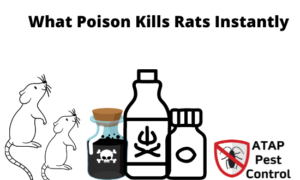Atap Exterminators are the best rat exterminator in Chicago; those kill rats instantly. For more information, call .
Bromadiolone is a rat and mouse poison. Anticoagulants like bromadiolone stop blood clotting. Unlike other rat poisons, bromadiolone can be deadly after only one day of feeding. Bromadiolone was initially registered in 1980. It is a white to golden powder with no odor.

Which Products Include Bromadiolone?
Bromadiolone is in approximately 130 items. These are pellets or bait blocks containing 0.005% bromadiolone. Their current applications include structures and cars. Store products often contain blue-green or red dye. This can assist detect an animal’s exposure. To avoid the potential of the unintentional child and wildlife poisoning, bromadiolone products are exclusively sold to professionals. Most applications also call for a professional to deter access. Always read labels and take precautions to avoid exposure. In exposure, carefully follow the First Aid recommendations on the product label.
What is Bromadiolone?
A clotting agent, bromadiolone, prevents the body from recycling vitamin K. Animals without vitamin K can bleed to death. The body’s vitamin K levels can be depleted over several days. Thus, exposed animals may perish over several days. Some people always ask what poison kills rats instantly.
How Can I Get Bromadiolone?
Touching or eating bromadiolone is the most common way to get it. Children and animals can get bromadiolone through granules or baits. Pets or wildlife may be exposed if they eat poisoned animals. Bromadiolone has trouble rising. So inhaling it is unlikely. Because the public sale is restricted, pesticide applicators are more likely to be exposed to bromadiolone. Reading and following label guidelines can limit exposure. To get rid of rats, always contact the best rat exterminator near me.
What Are the Effects of Brief Exposure to Bromadiolone?
Bromadiolone kills mammals. It stops the body from regenerating the vitamin K required for blood clotting. The body contains vitamin K stores; therefore, it may take time to delete them. Symptoms may not appear for five days following exposure or until just before death. Caution should be exercised when handling pets who have been poisoned.
Symptoms of bromadiolone consumption include nose bleeds, gum bleeding, bloody urine, black tarry stools, and bruises. Headaches, sore throats, muscle aches, shortness of breath, heavy periods, and bloody mucus are less common symptoms. When bromadiolone comes in touch with the skin, it can cause eye redness, edema, and discomfort.
Upon Absorption, What Happens to Bromadiolone?
Initially, most bromadiolone is degraded and excreted. In rat trials, 89 percent of the dosage departed the body in 4 days. However, bromadiolone tends to leave the body more slowly over time. This second stage’s half-life has been recorded as long as 170 days. Bromadiolone is not easily eliminated. This can cause bromadiolone accumulation in the body. This is especially true for low-dose long-term exposure.
Is Bromadiolone Likely to Cause Cancer?
No. When bromadiolone was tested on lab animals, no cancer was found. In lab tests on human cells, bromadiolone did not cause cancer.
Has bromadiolone Been Explored for Non-Cancer Effects?
Several studies fed very low dosages of bromadiolone to pregnant animals for days. Their babies showed no effects. But the mothers perished from bleeding, pale eyes, and weak muscles. Using adult rats and mice, researchers observed alterations in reproductive organs.
Is Bromadiolone More Sensitive In Youngsters than Adults?
Pesticides may be more toxic to children than adults. However, there is no evidence that youngsters are more sensitive to bromadiolone. From 1993-2008, the AAPC documented 12,000-15,000 accidental rodenticide exposures in children under 6. Most of the kids showed no symptoms, but a handful had severe poisoning symptoms. If utilized in a domestic setting, bromadiolone must be packaged in tamper-resistant bait stations to protect children.
Bromadiolone In the Environment
In tests using soil baits, 45-78 percent of the bromadiolone degraded in the first 21 days. Some research suggests it may take longer to decompose if animals store it underground, away from the elements. Soil movement of bromadiolone is limited. In four soil types, it was discovered in the top three millimeters. In sandy soil, it was more mobile. Water has a half-life of 392 days. It may not break down in all water conditions. Bromadiolone has a minimal potential to fly. It is not approved for usage near food. When sprayed to the soil, it only reached trace amounts in plants.
Can bromadiolone Harm Wildlife?
Rodent baits are made to entice animals. Most mammals and birds are poisonous to bromadiolone. A poisoned animal or appeal can be eaten by wildlife. Animals that consume a deadly dosage may continue to eat the bait for several days before dying. They may also be more vulnerable to predators. Poisoned rodents can kill wild mammals, birds, and other species. Bromadiolone accumulation in owls, buzzards, and other raptors has been widely reported.
Bromadiolone is hazardous to fish. It is poisonous to other aquatic creatures. But registered bromadiolone products cannot be used on water. So it is rare to encounter other marine animals. No harmful effects have been found in bromadiolone on snakes or earthworms.
What Kill Rats Instantly Home Remedies
Various symptoms indicate the presence of rats and mice. They frequently leave droppings inside. If left open, they will even eat your boxes, clothes, and food. So it’s critical to identify and eradicate these pests. Continue reading to learn how to get rid of mice naturally.
1. Mint Oil
Peppermint oil repels rats. Peppermint is pleasant to us, but not to rats, therefore use peppermint oil to keep them away from your home. Putting peppermint oil-soaked cotton balls in front of minor holes in your home will deter rats.
2. Paris & Cocoa Powder
Take one tablespoon cocoa powder mixed with plaster of Paris sprinkled around the rat and mouse standard trail Because cocoa powder attracts pests, they eat it gets dehydrated and suffocated. They flee their houses and die.
Hot pepper flakes keep rats and mice away by making them sneeze. Sprinkle hot pepper about your house’s entryway and corners to deter rodents.
3. Onions
Placing onions around minor holes and openings, and replacing them every second day, can deter rats. Onion’s pungent fragrance will soon drive them out.
